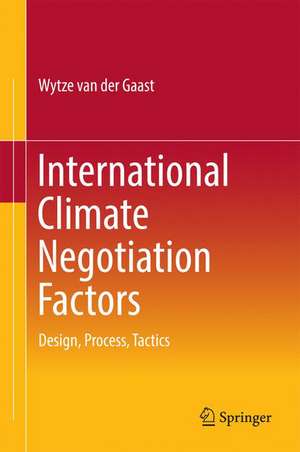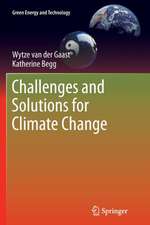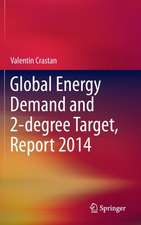International Climate Negotiation Factors: Design, Process, Tactics
Autor Wytze van der Gaasten Limba Engleză Hardback – 13 oct 2016
The book identifies a minimum of three conditions that need to be fulfilled for successful climate negotiations: the negotiations need to reflect the fact that climate change calls for global solutions; the negotiation process must be flexible, including multiple trajectories and several small steps; and decisive tactical maneuvers need to be made, as much can depend on, for example, personalities and the negotiating atmosphere. With regard to the design of an international climate policy regime, the main challenge presented has been the inability to agree on globally supported greenhouse gas emission reduction measures.
The book offers an excellent source of information for researchers, policymakers and advisors alike.
| Toate formatele și edițiile | Preț | Express |
|---|---|---|
| Paperback (1) | 633.35 lei 6-8 săpt. | |
| Springer International Publishing – 16 iun 2018 | 633.35 lei 6-8 săpt. | |
| Hardback (1) | 639.41 lei 6-8 săpt. | |
| Springer International Publishing – 13 oct 2016 | 639.41 lei 6-8 săpt. |
Preț: 639.41 lei
Preț vechi: 752.24 lei
-15% Nou
Puncte Express: 959
Preț estimativ în valută:
122.39€ • 132.99$ • 102.87£
122.39€ • 132.99$ • 102.87£
Carte tipărită la comandă
Livrare economică 21 aprilie-05 mai
Preluare comenzi: 021 569.72.76
Specificații
ISBN-13: 9783319467979
ISBN-10: 3319467972
Pagini: 149
Ilustrații: XV, 134 p. 11 illus., 4 illus. in color.
Dimensiuni: 155 x 235 x 10 mm
Greutate: 0.39 kg
Ediția:1st ed. 2017
Editura: Springer International Publishing
Colecția Springer
Locul publicării:Cham, Switzerland
ISBN-10: 3319467972
Pagini: 149
Ilustrații: XV, 134 p. 11 illus., 4 illus. in color.
Dimensiuni: 155 x 235 x 10 mm
Greutate: 0.39 kg
Ediția:1st ed. 2017
Editura: Springer International Publishing
Colecția Springer
Locul publicării:Cham, Switzerland
Cuprins
Introduction.- Climate Negotiation Factors: Design, Process and Tactics.- The First Phase - Negotiating the UN Climate Convention.- The Negotiation Process Leading to the Kyoto Protocol.- Towards a Future Climate Policy – From the Kyoto Protocol to the Paris Agreement.- Dealing with the Climate Negotiations Paradox.
Notă biografică
Dr Wytze van der Gaast is a senior advisor on greenhouse gas (GHG) accounting issues, technology transfer and pathways for climate and development. He has participated in several capacity building projects in developing countries on emissions trading under the Kyoto Protocol. He was coordinator of the EU-funded project Promoting Sustainable Energy Technology Transfers through the Clean Development Mechanism (CDM): Transferring from a theoretical concept to practical action (ENTTRANS).
He co-authored the 2010 version of the ‘Handbook for Conducting Technology Needs Assessments for Climate Change ’ for the UNDP. As a consultant for the UNFCCC secretariat he wrote two background papers for the Global TNA Workshop (1–2 June 2011, Bonn, Germany), a background paper for the UN Technology Executive Committee (27 March 2013, Bonn, Germany), a synthesis report, and a good-practice report on technology needs assessments. He was an advisor to the Government of Montenegro on conductinga technology needs assessment. Dr Wytze van der Gaast was also a consultant to the EU Regional Environmental Network for Accession (RENA) project for low emission development in the Balkan region. Together with UNDP, UNEP Risoe Centre, REEEP, the Netherlands Government and the ECN he is developing the online climate technology database ClimateTechWiki. He is currently involved in four EU-funded research projects on environmental policy effectiveness (APRAISE), climate policy making (POLIMP), competitive biomass-to-energy pathways (BIOTEAM), and connecting SMEs for a green economy (GreenEcoNet).
He co-authored the 2010 version of the ‘Handbook for Conducting Technology Needs Assessments for Climate Change ’ for the UNDP. As a consultant for the UNFCCC secretariat he wrote two background papers for the Global TNA Workshop (1–2 June 2011, Bonn, Germany), a background paper for the UN Technology Executive Committee (27 March 2013, Bonn, Germany), a synthesis report, and a good-practice report on technology needs assessments. He was an advisor to the Government of Montenegro on conductinga technology needs assessment. Dr Wytze van der Gaast was also a consultant to the EU Regional Environmental Network for Accession (RENA) project for low emission development in the Balkan region. Together with UNDP, UNEP Risoe Centre, REEEP, the Netherlands Government and the ECN he is developing the online climate technology database ClimateTechWiki. He is currently involved in four EU-funded research projects on environmental policy effectiveness (APRAISE), climate policy making (POLIMP), competitive biomass-to-energy pathways (BIOTEAM), and connecting SMEs for a green economy (GreenEcoNet).
Textul de pe ultima copertă
Providing a detailed examination of climate negotiations records since the 1990s, this book shows that, in addition to agreeing on climate policy frameworks, the negotiations process is of crucial importance to success. Shedding light on the dynamics of international climate policymaking, its respective chapters explore key milestones such as the Kyoto Protocol, Marrakech Accords, Cancun Agreement and Doha Framework.
The book identifies a minimum of three conditions that need to be fulfilled for successful climate negotiations: the negotiations need to reflect the fact that climate change calls for global solutions; the negotiation process must be flexible, including multiple trajectories and several small steps; and decisive tactical maneuvers need to be made, as much can depend on, for example, personalities and the negotiating atmosphere. With regard to the design of an international climate policy regime, the main challenge presented has been the inability to agree on globally supported greenhouse gas emission reduction measures.
The book offers an excellent source of information for researchers, policymakers and advisors alike.
The book identifies a minimum of three conditions that need to be fulfilled for successful climate negotiations: the negotiations need to reflect the fact that climate change calls for global solutions; the negotiation process must be flexible, including multiple trajectories and several small steps; and decisive tactical maneuvers need to be made, as much can depend on, for example, personalities and the negotiating atmosphere. With regard to the design of an international climate policy regime, the main challenge presented has been the inability to agree on globally supported greenhouse gas emission reduction measures.
The book offers an excellent source of information for researchers, policymakers and advisors alike.
Caracteristici
Analyzes a number of climate negotiation records at the highest political level (country commitments), as well as at more technical negotiation levels (working out technical modalities) Offers readers essential insights into the factors that influence the success and failure of climate negotiations Highlights the importance of flexibility and tactical maneuvers during the negotiation process Includes supplementary material: sn.pub/extras





























